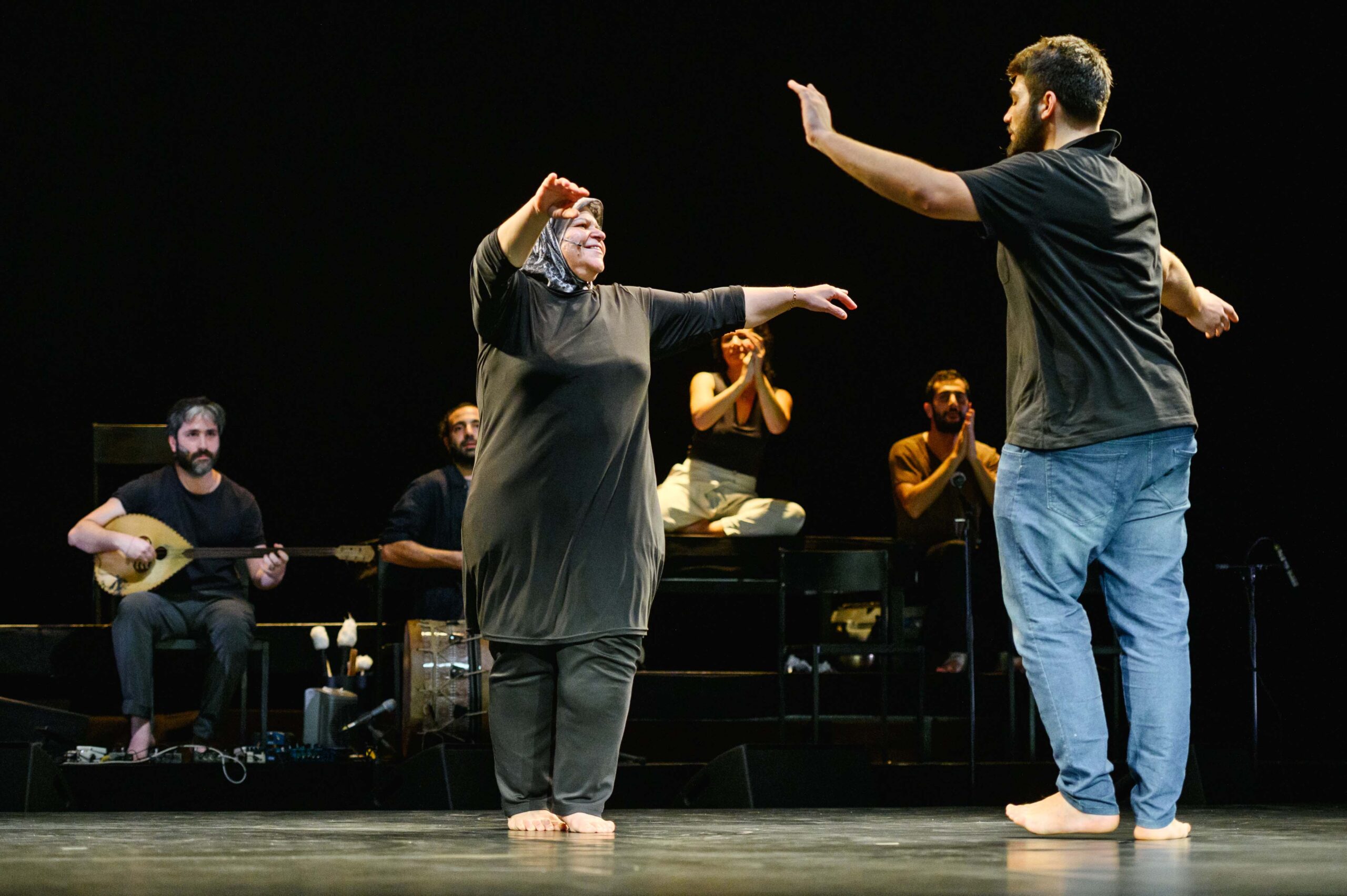synthesizing the unmeasurable
amilton de azevedo writes about Told by my mother, by Ali Chahrour (Lebanon), presented in the 2024 Festival TransAmériques (FTA – Tiohtià:ké/Montreal). this text is part of a special coverage; the critic traveled to Canada at the invitation of the FTA.
A mother who saved her son dances with him on stage; they dance their story. A mother who saved her son dances with him on stage; they dance the story of a mother who, up until her last breath, looked for a missing son. When Ali Chahrour entangles these narratives in Told by my mother (Lebanon, 2021), both completely perpassed by cultural, religious and sociopolitical matters, there is something that becomes somehow universal: a mother, a son, life, death, the will to sing a child to sleep, the hope of seeing a loved one again, the right to bury a body.
Relations and desires that echoes through time in fiction and reality. From tragic heroines fighting the system on behalf of their relatives to Argentinian abuelas (grandmothers) of the Plaza de Mayo, still finding kidnapped grandsons after decades of the political assassination of their mothers, or the mujeres de Calama (women of Calama) scraping the sand of Atacama desert for the remains of those who disappeared during the dictatorship in Chile.
- Read more: access this link for more theater critics written in english
The political aspect of the narrative is quite unavoidable, especially while getting to know Fatmeh and Hassan’s context. But what seems to matter to Chahrour is not only what is being told, but how to tell. Told by my mother invests in a clockwork mise-en-scène, where precise gestures, choreographies and compositions are the resources for moving affections both on stage and in the audience.
By doing so, the work creates for itself an intimate theatricality in the encounter of a kind of ritualistic atmosphere fulfilled by what emerges as a poetic honesty seen in the presence of the performers’ pulsating bodies – Abbas Al Mawla, Ali Chahrour, Leila Chahrour, Ali Hout, Abed Kobeissy and Hala Omran are with their hearts and souls to show. Allied with the intense musicality (by Two or The Dragon – Hout and Kobeissy), that plays a key part with their transforming sound landscapes, each particle seems to tell an entire story.
In that sense, the feeling is that Told by my mother surpasses its 70 minutes duration by the way it reshapes time, making it move like the flow of a wild river that may run during storms, but even when it seems stopped, there is movement under the surface. Told by my mother makes use of the temporality of the rite, suspending the instant for it to be fully perceived, experienced, lived through.
Chahrour’s direction is founded by a outstanding notion of what each scene needs – music (sound design by Benoit Rave), light (by Guillaume Tesson), movement, text, chants: the staging as a whole is always moving towards a (complex) simplicity that allows Told by my mother to synthetize the unmeasurable of pain, grief, love, life, death and rebirth.
So when they dance, they move stories and affections; and the same quality of movement can be transformed into new feelings and significances. As the beat of the drum can be bombs dropping or a heart beating, a pulsating body can be overwhelmed or desperate. Everything vibrates. How many bodies in a life, how much life in a body: they are evocating and invocating, struggling and celebrating, living and dying. When Omran sings asking for feathers, Chahrour is summoning wings for himself.
A body is ceremoniously rolled through the stage. A body falls dead. A body is revived. Past and present are one when Told by my mother not only retells stories, but imagines the other possibilities, different unfoldings, encounters yet to (never) come. Within every single move, the attempt to dance death and to dance the dead. To dance the vanished and to dance the reappearance.


Amazing!
Meu filho, mesmo em ingles você mantém o estilo poético que envolve toda a sua escrita. Que lindo.